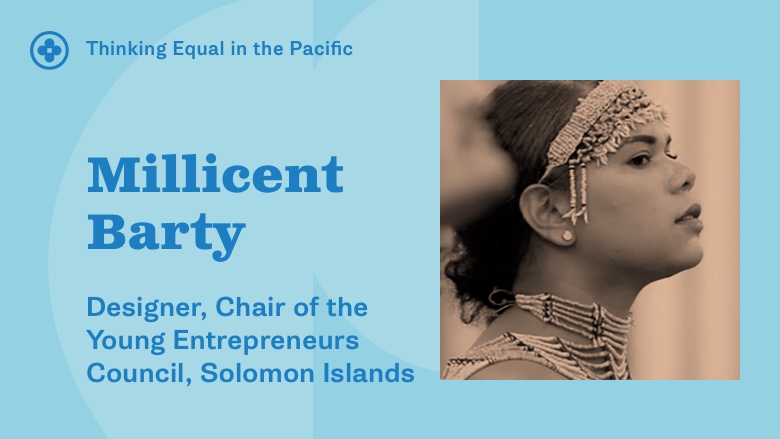I am a Solomon Islander by heritage, with an upbringing in Jakarta, Indonesia being raised by my British stepfather. I am the only girl with four brothers. I am incredibly passionate about entrepreneurship, youth empowerment, literacy and I like to think of myself as an ethnographical enthusiast with a deep passion in traditional oral histories of the Pacific.
I studied Design at Goldsmiths College, University of London where I developed a communication tool to present new and complex information using infographics. This makes it easier for illiterate people to consume traditionally oral stories. After graduating, I returned home and I decided to start my own business (Millicent Designs) which specialises in communications and humanitarian design.
In my role as Chair of the Young Entrepreneurs Council Solomon Islands) I’m focused on building an entrepreneurial ecosystem in the Solomon Islands to tackle high youth unemployment; managing YHER Pacific (through YGAP). YHER is a regional accelerator that provides training for female entrepreneurs working in social enterprises, including a fashion house, a mobile health provider, and GIS mapping. My project – Kastom Story Time – aimed at preserving our traditional oral history – was awarded the Queen’s Young Leaders Award in 2018.
What inspires you to get up in the morning? What drives you?
Life inspires me to get up in the morning and the bigger picture or rather; my vision, driven by the engines of my various responsibilities and passion are what drives me.
As cliché as that may seem and as fuzzy as I may feel most mornings, it’s the mornings when I am reminded of my vision; whether it be seeing a little school girl on the streets on her way to school, seeing a young mother carrying her fish’n’chips to sell on the roadside, or even a young man refilling his taxi to start work for the day.
What are your hopes for the future?
My hope is a progressive future where sons and daughters are equally encouraged to develop their personal, educational and professional goals on a level playing field. A future where gender equity is embraced not ‘merely tolerated’ and everyone is liberated enough to create their own opportunities and not be heavily dependent on politicians.
To achieve these hopes, more of my people need to be literate to be liberated from the traditional perspectives that undermine sustainable development. We need a less desensitised generation to violence (including an eradication of gender-based violence). We need good governance with realistic projections and long-term vision and focus in infrastructure and sustainable development. We need inclusive representation of women and youth in leadership and development.
And our traditional culture must be preserved, celebrated and embraced in amalgamation with ‘modernity’: a progressive and transcendental future where the old and new have a common ground to allow space for greatness.
Do you have a favourite quote or saying?
“Be strong enough to stand alone, smart enough to know when you need help and brave enough to ask for it.”
Where do you see Solomon Islands and women in 25 years?
To put this into perspective, 10 years ago (2009), I was 18 and had the privilege of being Miss Solomon Islands (2009-2010) where I proactively engaged in the very same-old narratives concerning women in leadership. I am now 28, and I still have to protest against the same narratives questioning the abilities of a woman to be a leader.
So… where I see Solomon Islands in 25 years’ time, in terms of women in leadership at any arena is rather obscure. However, given the rise of the number of women who are currently thriving in respective industries and authorities here, the very women who are the saving grace of our nation fighting day in and out for the disempowered, I am hopeful and optimistic that in 25 years time, there will be a silver lining.
In order to get there, our governance and systems need to be heavily streamlined to be improved. Basic services must be accessible, law and order must be in marriage to enforcement, unity must be consistent, human capacity must be built and this can only come about when synergies are formed and prioritised with a collective unified vision.
What change would you like to see that could bring greater equality for women in Solomon Islands?
Gender equality must be infiltrated, taught and nurtured in our education system. It is too late for our generation who have sadly become desensitised to gender-based violence (according to UN Women and SPC, three in every four women are victims of domestic violence; that’s 64%). And, according to Oxfam’s Side by Side gender equality project, 72% of our youth population believe domestic violence should be tolerated to keep the family together.
But it is not too late to start improving the system for the next generation to bring greater equality for the future of the stance of Solomon Islands women.
If you could use one word to describe women in the Pacific what would it be?
Resilient.
What about in Solomon Islands?
Under-represented.
**The World Bank is working in Solomon Islands with projects that focus on rural development, community governance, improving the delivery and sustainability of energy and creating more job opportunities.
**The views expressed in this article do not necessarily represent the views of the World Bank Group and its employees.

